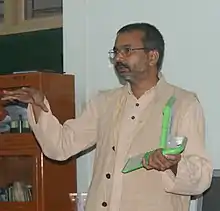Nagarjuna G.
Nagarjuna G. (Nagarjuna Gadiraju) works in the Homi Bhabha Centre for Science Education, Tata Institute of Fundamental Research in Mumbai, India. His major research interests include Science Education, Cognitive Science, History and Philosophy of Science and Structure and Dynamics of Knowledge. As an activist he focuses on promoting free knowledge and free software and serves as the chairperson of Free Software Foundation of India.
Nagarjuna Gadiraju | |
|---|---|
 Nagarjuna G. at an OLPC Workshop in Goa 2010 | |
| Born | 3 August 1960 |
| Nationality | Indian |
| Other names | gnowgi, gn |
| Alma mater | IIT Kanpur |
| Occupation | Faculty at HBCSE, TIFR, Chairperson of Free Software Foundation of India |
| Known for | Free software movement, Gnowsys |
| Website | |
Biography
Nagarjuna was born in 1960 at Nagarjuna Sagar, in Andhra Pradesh, India.
Education
Nagarjuna did M.Sc. in Biology and M.A. in Philosophy from Mumbai and Ph.D. in Philosophy of Science from IIT Kanpur.
Work
Some of his areas of interest are semantic web, knowledge organization, AI, philosophy of science, biological roots of knowledge and modelling complex systems with specific interest in cognitive development. He is the author of a specification and implementation of a distributed knowledge base called GNOWSYS.[1] He is an architect of gnowledge.org, a community portal, which was launched on 2 February 2007. He contributed as a core developer and architect of SELF Platform. He is currently guiding four research scholars in the area of science education at HBCSE, TIFR.
Free Software Foundation
Nagarjuna is an active member of the Free Software Foundation in India. He is one of the speakers for the FSF.[2] He is a founding member, current chairperson and the member of the board of directors for the Free Software Foundation of India.[3]
History and Philosophy of Science
Nagarjuna has interest in History and Philosophy of Science. He has created an illustrated exhibition on History of Science at Homi Bhabha Centre for Science Education.[4] He also teaches graduate courses in History and Philosophy of Science at Homi Bhabha Centre for science Education and Centre for Excellence in Basic Sciences.[5]
References
External links
| Wikimedia Commons has media related to Nagarjuna G.. |